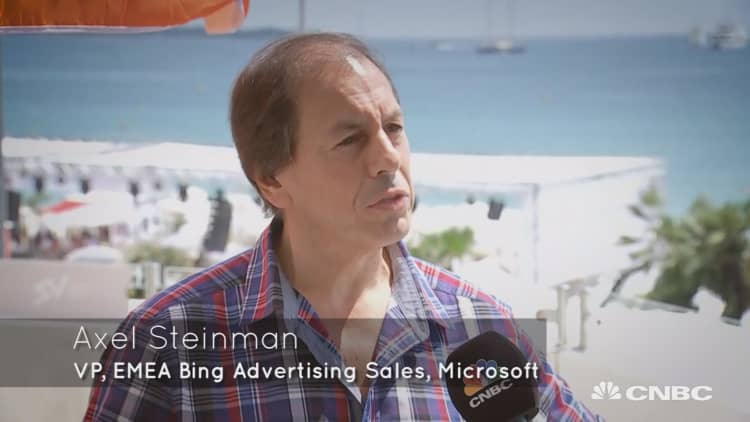
Artificial intelligence (AI) and its application to communication is a hot topic at the Cannes Lions International Festival of Creativity in France this week.
Attendees at the largest gathering of advertising and marketing professionals in the world can sit in on a presentation titled "How will AI shape the future of Hollywood?" or go to a talk called "Androids, AI and the future of human creativity."
Elsewhere, they can hear from Publicis Groupe, the ad agency conglomerate that said it would not attend Cannes Lions this year to instead invest in an internal communications computer program called Marcel, but then did an about-turn to show off the aforementioned new platform at the festival.
But marketers at the event have emphasized that, for all its potential, AI will never replace the emotional connection with consumers that is now so important for brands.
"Marketing will never be done by robots," John Travis, Adobe's vice president of brand marketing, told CNBC. "And… instinct, emotion, all of that which marketers we always talk (about), is more important than ever."

Speaking on a panel at the event Tuesday, Procter & Gamble's Chief Brand Officer Marc Pritchard said human creativity won't be replaced by machines.
"Can machines do analysis? Yes. Can machines do algorithms? Yes. Can machines sift through mass amounts of data? Yes. Can machines gain consumer empathy and insight? No. Can machines come up with brilliant creative ideas that touch human emotions? No," he said.
"I think that there will absolutely be a place for machine learning or algorithms, or data, but I really believe that it won't replace the humanity of creativity. Creativity is still a very human craft," Pritchard added, citing P&G's award-winning work for "Always - Like a Girl" and "It's a Tide Ad," which was aired during this year's Super Bowl.
One area where AI is being deployed is in programmatic advertising, where adverts are automatically placed on websites and targeted at people based on their online browsing. P&G has increased its spend in this area, while decreasing ad dollars on big platforms such as Google and Facebook.
Pritchard added that the business had moved from being one focused on mass marketing, to one that could personalize ads to consumers on a large scale.
Adobe has changed from being a business that sold boxed software, such as Photoshop, to a subscription model, so using marketing to retain customers has become much more important for the company. But this is a blend of science and art, Travis told CNBC.
Adobe's Marketing Cloud helps brands measure the effectiveness of their communications and uses AI to better target consumers. "I love data analytics — that makes me such a better marketer and finally have a seat at the table (and) I can prove my value. But the emotional connection (is) more important than ever," Travis said.
"If you've… just bought Photoshop we suggest things that you can do based on your behavior. We put a lot of effort into making sure if we see that a customer is inactive we engage them," he told CNBC.
AI will help "liberate people from the mundane," he added. So if they are searching for a photo that conveys a particular mood, computer programs can help. "These are things that people would spend hours and hours and hours searching for. Now through AI things can be done… literally in seconds."
But the business is also looking to engage the creatives who use Photoshop in an emotional way, such as its "Hidden treasures of creativity" campaign that saw it make digital Photoshop versions of the paintbrushes used by "The Scream" artist Edvard Munch. Creatives were invited to paint their own Munch-style artworks using the brushes with the winning artist Johann Brangeon seeing his creation displayed in the Munch Museum in Oslo, Norway.
For Raja Rajamannar, chief marketing officer at Mastercard, AI can replace a substantial part of repetitive tasks or data analysis. Speaking on a panel at the event, he said: "Is it going to replace human beings? Hopefully, not in my lifetime."

